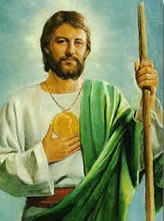The Monthly Note
April 2006
The sign of the breaking of the bread
by Fr. Émery Désilets, OP
In every stories of apparition, much emphasis is placed on this sign. It is so in all the writings of the New Testament. It is at the breaking of the bread that the disciples of Emmaus recognized the Risen Christ.
In the story pertaining to the disciples of Emmaus’ experience, Saint Luke rereads the progression of faith of the first Christians. He did this rereading because of the problems of the Church of the time. The Christians of the second and third generations considered themselves penalized as opposed to those of the first generation. They had not seen, nor known, Jesus of Nazareth. They had not been witnesses of the sign of the tomb, nor of the sign of apparitions.
Saint Luke reminds them, and this applies to us as well, that they have at their disposal the testimony of the first Christians, the testimony of the Gospel as well as the breaking and sharing of the bread. And, because this is all linked to the sign of the breaking of the bread, at the Eucharist, in the everyday life of the Christian communities, when they were all assembled to repeat the gesture of the Last Supper, they listened to the testimony of the first witnesses; they listened and shared the Word of God. Saint Luke thus puts emphasis on the sign of the breaking of the bread. This sign, with all that revolves around it: the sign of the Word, the sign of assembly, the sign of mutual prayer, is for us the archetypal sign of the Risen Christ.
This sign sums up all of Jesus’ life. In this way, in the sign of the broken and shared bread as well as the offered cup, Jesus gives himself up to His Father and to us. He is there undivided in the Eucharistic act. We can understand that, after resurrection, the disciples recognized Him by this sign. It is around this act that they assembled. It is though this gesture that they gathered on the eighth day. It is though this gesture that the First Christians learned to make their lives a shared bread and an offered cup for all, in unanimity of heart and soul in God.
May it be the same for us all.
Émery Désilets, o.p., Director.
«...while Jesus was with them at table, he took bread, said the blessing, broke it, and gave it to them. With that their eyes were opened and they recognized him» (Lk 24, 30-31)


